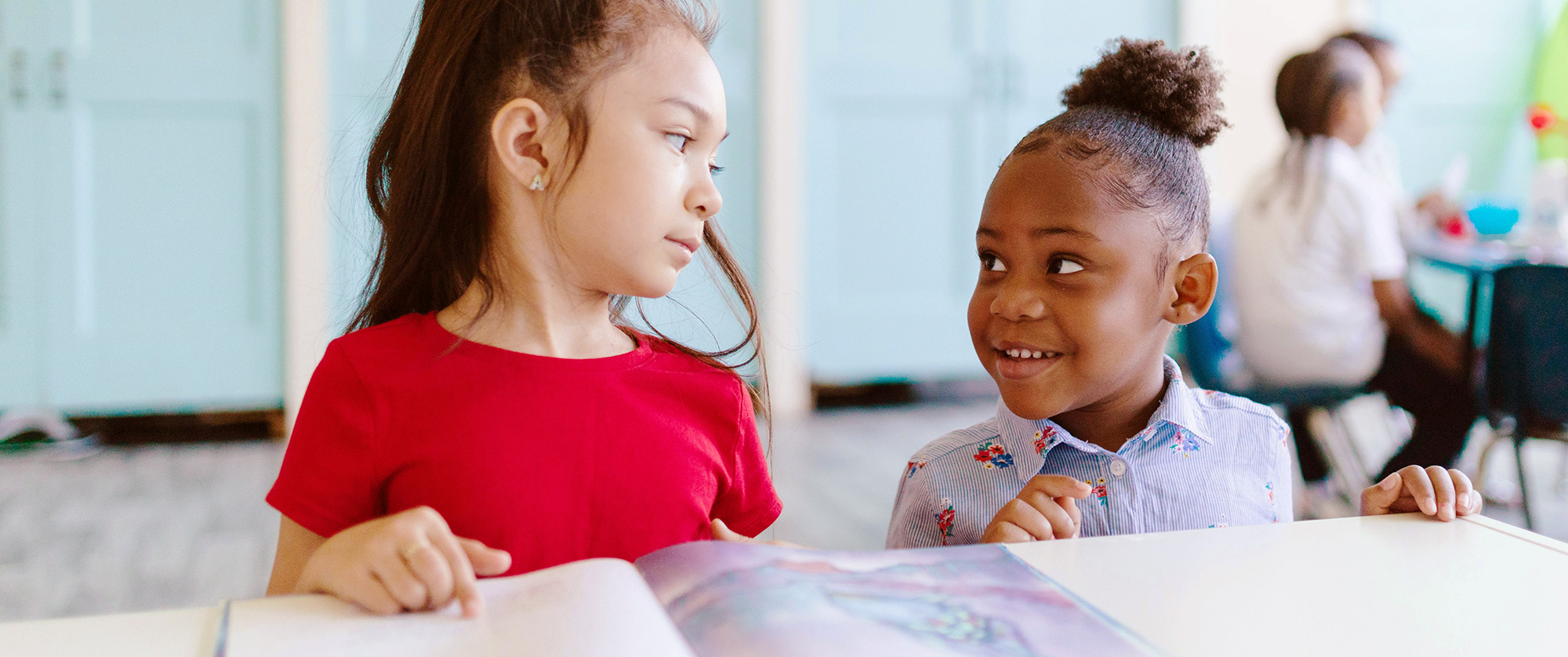The research on what happens if 1st graders haven’t reached a 1st grade reading level by the end of the school year has made one thing perfectly clear — students who need extra support to learn to read cannot wait for help. Reading intervention should begin in the primary grades, and it must be evidence-based.
Why does the research say literacy intervention in 1st grade matters so much? What should that look like to maximize student outcomes? And which solutions are school districts using to ensure their 1st graders are getting the help they need, when they need it, and how they need it?
We’ve compiled the research to answer those questions, along with a look at how one school district has prioritized just-in-time intervention for 1st grade readers who aren’t reading on grade level — with incredible results.
Why Does 1st Grade Reading Matter So Much?
First grade is the crucial school year that can determine what kind of reader a child will be … for the rest of their lives.
This is not hyperbole. Studies tell us that when 1st graders don’t develop critical foundational skills, they won’t have the knowledge they’ll need to become successful decoders and therefore won’t have the skills to comprehend the text they read, setting off a domino effect that will extend far beyond the primary grades.
First graders need to master phonological awareness, phonics, fluency and high frequency words to be fluent, on-level readers by the end of the year. Without that strong foundation by the end of 1st grade, students are ill-prepared for grade 2, when reading instruction is all about applying this knowledge to read more complex words — and thus more complex text.
Consider the stakes:
- One in six kids who are not reading proficiently in the 3rd grade will either drop out or not graduate from high school on time (a rate four times greater than that of proficient readers).
- If a student is not reading on grade level by the end of their 1st grade year, there’s nearly a 90 percent chance they’ll still be reading below grade level in 4th grade.
- If a child has low oral reading fluency scores at the end of 1st grade, they’re more likely to have low reading comprehension scores at the end of 2nd grade.
- A student’s reading skills in 1st grade are a strong predictor of reading skills at age 42. Those who are struggling during this early state of literacy are also more likely to be struggling with reading in middle age.
There is, however, good news to be had when 1st grade students get the foundational skills instruction they need:
- The research shows that the majority (83 percent) of 1st graders who are on benchmark for phonics are on track to be on benchmark for all reading skills in 3rd grade.
- Having a solid mastery of foundational reading skills by the end of 1st grade has likewise been shown to have a “protective effect” for some of our student populations at the highest risk of dropping out of school, including students who are homeless and/or living in extreme poverty.
Setting the Stage for Success: Kindergarten Reading Skills
Success in 1st grade is dependent on a number of factors, not least of which is a strong start on the most basic of foundational reading skills in kindergarten.
Reading standards in states across the country outline similar expectations for kindergartners. By the end of this primary grade, students are expected to have mastered a number of foundational skills, including:
- The ability to understand print conventions, such as the knowledge that English print is read top to bottom, left to right, page by page
- The ability to understand that printed letters work together to form words and that these words are related to oral language
- The ability to identify the lowercase and uppercase versions of the 26 letters of the English alphabet by name, understand the correspondence between each letter and the sound it produces in oral language, and to form each letter in writing
- The ability to demonstrate an understanding of spoken words, syllables, and sounds (this can look like counting or blending syllables, blending onsets and rimes, isolating individual phonemes in a CVC word, or substituting sounds)
- The ability to recognize 20-50 common high-frequency words by sight
These skills give rising 1st graders the tools they need to continue interacting and interpreting text as they deepen their understanding of how letters work together in the English language.
What Do Kids Learn in 1st Grade ELA?
First grade foundational reading skills instruction picks up right where kindergarten left off with instruction that builds on students’ understanding of spoken words, syllables, and sounds. First graders learn a host of skills, including how to:
- Blend and segment the sounds in one-syllable words
- Decode regularly spelled one-syllable words
- Distinguish long from short vowel sounds
- Understand final -e and common vowel team conventions, as well as consonant digraphs
- Use knowledge that every syllable must have a vowel sound to determine the number of syllables in a printed word.
- Decode two-syllable words that follow basic patterns, understand and apply the knowledge that each syllable must have a vowel sound, read words with inflectional endings
- Recognize and read grade-appropriate irregularly spelled words
- Write a sentence using distinguishing features such as first letter capitalization and ending punctuation
By the end of the year, students should have learned the skills required to read grade-level text orally with accuracy and expression, reading at the appropriate rate.
This accuracy and fluency will set them up to be ready for multisyllabic decoding work and support the comprehension tasks that lie ahead of them as they head into 2nd grade. It will also ensure they have the confidence to read independently and thus build stamina, both of which are necessary for kids to engage with increasingly complex texts AND build knowledge.
Reading research has proven almost all children can develop grade-level word reading skills by the end of 1st grade, but this is dependent on kids receiving not just evidence-based Tier 1 instruction but also Tier 2 reading interventions like high-dosage tutoring when needed.
Clearly, the stakes of ensuring this happens couldn’t be higher for our 1st graders, so how do we ensure every child has the skills they need by the end of 1st grade to set them up for success?
One School District’s 1st Grade Reading Solution
One school has doubled the number of 1st graders reading on grade level and in merely three months achieved a 69% decrease in the number of students requiring intensive support.
Take a look at how Revere Public Schools in Massachusetts is closing reading gaps by leveraging Ignite Reading as a just-in-time intervention for 1st graders.
A Reading Intervention Pilot
In spring of 2023, educators in Revere, Massachusetts saw a problem at two of the elementary schools in Revere Public Schools (RPS) — 42 percent of the 1st graders had reading skill gaps that placed them at kindergarten reading levels.
These 1st graders were on a path to start 2nd grade still working on skills like learning letter names and sounds — or reading basic words like bat and sit — when they should have been entering 2nd grade reading full paragraphs of simple text.
RPS partnered with Ignite Reading to kick off a pilot program for a total of 50 students to receive daily intervention in the form of one-on-one daily virtual tutoring by Ignite Reading’s expert tutors.
Individualized Instruction
Assessments by Ignite Reading tutors revealed nearly half of the RPS 1st graders were still working with kindergarten-level foundational skills.
To help students close their reading gaps, Ignite Reading paired each child with a virtual tutor highly trained in providing explicit, direct instruction of foundational reading skills. Instruction was differentiated to meet the unique needs of each student and delivered one-to-one daily during the school day.
During the pilot period, students got an average of eight hours of one-on-one individualized instruction and made over three weeks of progress in reading skills for every week in the Ignite Reading program.
Expanding the Partnership
Fresh off the success of the pilot program, Revere Public Schools expanded its partnership with Ignite Reading for the 2023-24 school year. RPS students across six elementary schools now receive daily one-on-one foundational skills tutoring.
At Revere’s A.C. Whelan Elementary School, Literacy Coach Stefanie Porrazzo has seen a remarkable change in her students since the district decided to support each at-risk 1st grader with an Ignite Reading tutor for daily intervention in addition to their classroom Tier 1 and Tier 2 instruction.
The ‘23-’24 school year began with 33 percent of A.C. Whelan 1st graders reading at grade level. Three months into the program, 64 percent of 1st graders were reading at grade level.
“You see it in the classrooms, and you see it in the kids’ faces, and you see it when they come to the library. They want to read books, and they want to show you how they’re doing.”
— Stefanie Porrazzo, literacy coach, Revere Public Schools, Revere, Massachusetts
After three months with Ignite Reading:
- DIBELS assessments showed averages of between eight months and 18 1/2 months of growth (yes, you read that correctly … 18.5 months!).
- The number of 1st graders at A.C. Whelan who were in need of intensive support (meaning they were well below grade level at the beginning of 1st grade) decreased by 69 percent — from 63.5 percent to 19.8 percent.
“We’ve just had such a positive response,” Porrazzo said. “This is our neediest grade in the school, and we’re closing those gaps and they’re becoming some of our most successful readers.”
About Ignite Reading
Ignite Reading delivers 1:1 online tutoring to students who need extra support in learning to read. Our expert tutors teach students the foundational skills they need to become confident, fluent readers by the end of 1st grade.
With a team of literacy specialists and highly trained tutors, we provide daily, targeted instruction that quickly closes decoding gaps, so students can successfully make the transition from learning to read to reading to learn.




